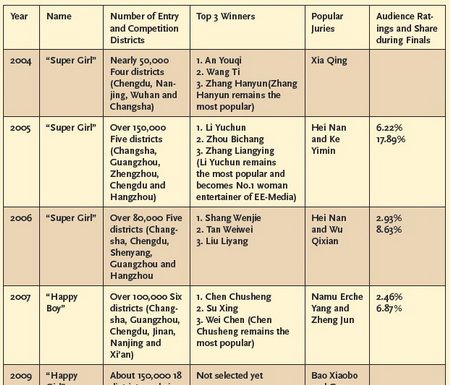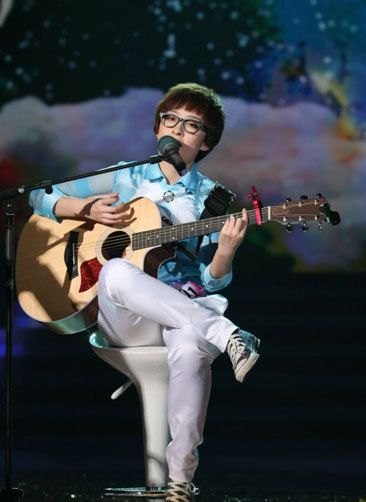颇受争议的快女黑马曾轶可
|
爱思英语编者按:曾轶可,这个唱歌走音,却得到不少评委赞叹,气跑了包小柏,现在还挺进了10强的女生,在一些人眼里她代表了90一代年轻人的个性,“没有黑幕,我们就是觉得她挺好玩的”,天娱一位高层这样评价她说。 从300强突围赛到全国20强晋级赛,选手们之间的较量越来越激烈。而相比于台上选手间的较量,评委之间的暗战竟不可思议地上升到现场吵翻脸的地步。比赛实力派选手众多,来自沈阳赛区的创作型选手曾轶可成为了其中的一个“异类”。在PK环节中,三个习惯用吉他弹唱的原创型选手陶银利、曾轶可和陈慧娟被分在一组,三个评委经过很长时间的讨论之后,沈黎晖宣布曾轶可成为最后一个晋级全国20强的选手。如今她已顺利进入快女10强的名列,同时也成为最受争议的选手之一。 包小柏不满曾轶可晋级愤慨离场,在“快女”退席后引得争议四起,7月8日一同来长沙参与《节节高声》得包小松对于弟弟当初的决定虽然表示“是音乐人的坚持”,但对于走音的曾轶可层层晋级,他直言“破坏了唱歌比赛的基本原则”。 “正是一位像曾轶可这样备受争议的选手给了观众们一种真正参与进来的感觉,让他们感觉自己才是节目的主导”娱乐圈从业人员于东平说。
“A controversial candidate like Zeng offers audiences a sense of participation, and they feel they are the masters of the program,” says Yu Dongping, a researcher specializing in the entertainment industry. Sporting short-cropped hair, a white shirt and black trousers, she stood at ease before the microphone, strumming her acoustic guitar and singing “Redundant Falling Star.”
Fans waved her portrait in the air, swaying in rhythm with her original, gentle, simple song. Zeng paused a few seconds, then continued, maintaining a faint smile. This incident was by no means unusual for Zeng.
Since she entered the national rounds of the Hunan 2009 Happy Girl Singing Competition in June, she remains by far the most controversial candidate. Those who support her affectionately dub her “sheep angel” for her “sheep-like thrill” and admire her “simple but pure and sincere” original music. 更多信息请访问:http://www.engbus.cn/ Those who hate her attack her as “tone-deaf” and urge her to quit the competition altogether. Zhao Xuan, 26, said Zeng was “defiling our ears.” They use different criteria to judge different candidates, claimed 26-year-old Liu Xin. “Why are other candidates eliminated for one wrong note, while Zeng never hits a correct note yet still remains?” Gu Bo, 25, believes Zeng has stayed the course through her “individuality.” “Zeng’s original music and special sound distinguish her from other candidates. She has a clear brand, easy to remember.” Lin Hongcheng, 27, agrees. Such debate reminds people of the most famous “Super Girl” of them all: Li Yuchun. Equally as divisive as Zeng, Li finally won out in the most famous 2005 contest with 3,528,308 public votes, and remains popular to this day. “Li’s success changed my attitude toward this program,” Lin said, “Different from official competitions like CCTV Young Singers Television Competition, this program focuses on entertainment and commerciality.” This year’s contest has been renamed Happy Girl, a reflection of the drastic and draconian changes to the format forced upon the program’s producers by China’s State Administration of Radio, Film and Television (SARFT) in the interests of more healthy viewing. On top of three years of heightening restrictions, SARFT this year finally forbid the show’s key money-making gimmick: popular voting via mobile phone text message, online or telephone. Now all voting rests in the hands of an expanded panel of expert judges that accept limited input from representatives of ordinary popular opinion. Not only that, but SARFT insisted the show be moved to 10:30 pm and expressly forbade so-called “sensational” scenes like “crying on each others’ shoulders” from appearing on screen. The spectacular commercial success and sensational popularity of Super Girl has long upset not only rival TV channels but some traditionalists within the Chinese government. Liu Zhongde, former Minister of Culture and President of China Association of Performing Arts criticized the show in 2006 for its “vulgar culture,” according to the culture column at 163 website. To prevent the negative effects of reality shows on youth, SARFT issued a policy in 2006 that any reality show could not be launched without their express advance permission and subject to requirements imposed by SARFT. The 2006 contest was forbidden to accept candidates under 18 years old, and “impractical, accusing or offensive” comments by jurors were prohibited. SARFT also banned the popular preliminary qualifying rounds in local districts from being broadcast on provincial satellite TV stations. Fast Facts Before 2009, the final result of the contest was determined by a professional jury and public SMS vote. SMS voting was forbidden this year, with the result determined by various judges 实习生:杨丽萍 编辑 |











